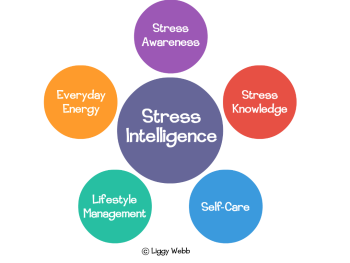Winter can be challenging at the best of times and with covid continuing to evolve with new variants and the potential impact this may have on our lives, it certainly does seem that our resilience is being truly tested.
Living with relentless change and uncertainty can take its toll on our stress levels and how we deal with setbacks and adversity will depend so much on our inner strength.
On a positive note, it is also worth bearing in mind that some of the curve balls that life will inevitably throw at us can also teach us some of the most valuable lessons when it comes to building our personal resilience.

So, before we even begin to explore resilience, I would like to emphasise first and foremost that being resilient is not about ‘toughing it out’, at any cost. Too often, especially in the work environment, I observe people doing this and sometimes to the detriment of their own physical and mental health.
Reaching out for unhealthy coping mechanisms may provide a quick fix in the short term; however, for long-term wellbeing, it is essential to pace ourselves. We need to acknowledge that, as human beings, we will of course have our own unique fragilities and vulnerabilities. Focusing on self-care and building a toolkit of positive and healthy coping mechanisms is one of the best ways to support a resilient mind.

What is resilience?
Resilience is about embracing our “humanness” and understanding and accepting that we will inevitably experience setbacks and disappointments. We will make mistakes and get things wrong because we were not born to be perfect; we were born to be real.
The word resilience derives from the Latin verb “resilire”, meaning to jump back or to recoil. In physics, resilience is the ability of an elastic material to absorb energy and release that energy as it springs back to its original shape. The recovery that occurs in this phenomenon is akin to a human being’s ability to bounce back after one of life’s various and inevitable challenges.
Resilience essentially is the process of adapting and recovering well from adversity, trauma, tragedy or threats. Some people describe resilience as: “the ability to bend, instead of breaking, when experiencing pressure” or “the ability to persevere and adapt, when faced with challenges”. The same abilities also help us to be more open and willing to take on new opportunities.
This is one of my favourite descriptions of resilience by a critical care nurse called Sonja M. Schwartzbach.
And then resilience enters the room, the most elegant of emotional beings; glowing; refined; a reminder that even a flicker of light glows amid the darkness. And we can save our tiny ship of troubles from life’s stormy seas once again.
So how can we build our personal resilience?
Being a resilient person is more than just being able to recover and survive, it is also about learning, growing and thriving as a person. Here are ten key strategies that can help us to be more resilient:
1. Take a journey of self-discovery
Self-awareness, self-confidence and self-efficacy all play an essential role in helping us to cope with stress and recover from difficult events. Understanding ourselves is the first port of call and then reminding ourselves of our strengths and accomplishments is key. Becoming more confident about our own ability to respond and deal with a crisis is an important way to build resilience for the future. Challenges can be steppingstones or stumbling blocks and nourishing the faith we have in our own ability to overcome them is the foundation piece. Also being aware of the options we have available to us in every given situation will help us to take personal responsibility and feel more confident and empowered.

2. See the glass half full
Staying positive during dark periods can be difficult and it is so helpful to maintain a hopeful outlook. Being an optimist does not mean being naive and ignoring the problem. It means understanding that setbacks are transient and that we have the skills and abilities to combat the challenges we face. There is a risk when something difficult arises that we fall into the pessimistic trap of believing that everything is doom and gloom. So much of resilience is about how we choose to respond to each situation and an optimistic perspective will most certainly lead us in a more positive direction. When faced with a negative thought it is worth asking the question – What else could this mean? Then seek out a positive alternative.

3. Manage emotions
Being emotionally aware and recognising how we can potentially react in certain situations will help us to exercise more self-control. It will also help us to be more considerate with regards to how our response can affect other people. High emotion can be exhausting so managing emotions during any ordeal will help us to focus our energy where it is best placed rather than fuelling unnecessary drama that can drain us. People who are emotionally intelligent and understand their emotions are generally far more resilient.

4. Change for the better
We may not always be able to control or change circumstances; however, we can absolutely choose and change our attitude towards them, so we are far more in control than we may initially believe. Flexibility is an essential part of being able to manage change and, by learning how to be more adaptable, we will be much better equipped to respond to any life crisis we may encounter. Resilient people often utilise these events as an opportunity to branch out in new directions. While some people may be crushed by abrupt changes, highly resilient individuals are able to embrace change and seek to use their energy to influence it.

5. Cope well with conflict
Conflict is an inevitable part of life and there is nothing wrong with it. It is only when it becomes combat that it becomes problematic. We all have different personalities and along with those go belief systems, values, perspectives, likes and dislikes. Some conflict can be difficult and, at times, unsettling – especially if you take it personally and are very sensitive. The outcome of conflict, however, can be positive. It can help us to create new ideas, learn from others, understand ourselves better, see different perspectives and improve our own communication. Learning how to cope with and manage conflict is a very important life skill in the increasingly diverse world that we live in. Being curious about others rather judgemental is an excellent way to approach life in general.

6. Embrace probortunities
The word probortunity is a fusion of the words “problem” and “opportunity” and looks at the concept of taking every problematic situation and seeking out the opportunity. It works on the premise that even in every crisis an opportunity will arise and there will be some benefit. It is a useful approach to problems and can help us look at them from a positive and solution focused perspective. Developing a good set of problem-solving skills is helpful too and knowing what practical steps to take can help build our confidence when we are faced with challenges.

7. Prioritise self-care
When we are feeling traumatised, stressed and upset, it can be all too easy to neglect our own well-being. Losing our appetite, overeating, not exercising, not getting enough sleep, drinking too much alcohol, not drinking enough water, driving ourselves too hard, are all common reactions to a crisis. This is the time when we need to work on building our self-nurturance skills, especially when we are troubled. Making time to invest in our wellbeing will boost our overall health and resilience and we will be much better equipped to face life’s inevitable challenges.

8. Nurture relationships
Building and sustaining a strong network of supportive friends, family and work colleagues will act as a protective factor during times of difficulty. It is important to have people we trust and can confide in. Whilst simply talking about a situation with a friend or loved one will not necessarily make troubles go away, it will allow us to share our feelings, gain support, receive feedback and come up with possible solutions to our problems. Listening to other people’s experiences can be useful too and, although we can’t always learn from others’ mistakes, there will certainly be some good advice out there. Perspective can be powerful and liberating.

9. Keep going
A quote that is often attributed to Winston Churchill is this: “If you are going through hell, keep going.” There is a lot to be said for picking yourself up, dusting yourself off and carrying on. It is not, however, as I mentioned before, about “toughing it out” at any cost. Self-care and being kind to ourselves in the process is vital. Being resilient is about the ability to bounce back and get on with life. The key is to think of each setback or upset as a steppingstone and it is important to be able to do this quickly rather than festering and ruminating for too long. Letting go of the angst that we may well experience is important rather than carrying lots of negative baggage that will just weigh us down and make the journey ahead much more difficult.

10. Create a vision
In times of crisis or when we are feeling low it is good to hold on to our dream and not lose sight of the fact that we can always have something to look forward to. There are lots of benefits to creating a vision and setting goals. First and foremost, they help us to develop clarity, which is the first step to helping us achieve what we want in life. Goals unlock our positive mind and release energies and ideas for success and achievement. Without goals, we simply drift and flow on the currents of life. With goals, we fly like an arrow, straight and true to our target. Setting goals, no matter how small they are, will give us direction, purpose, focus and most important of all, hope.
For updates for future blogs, free webinars and various other useful resources please do join my newsletter.














